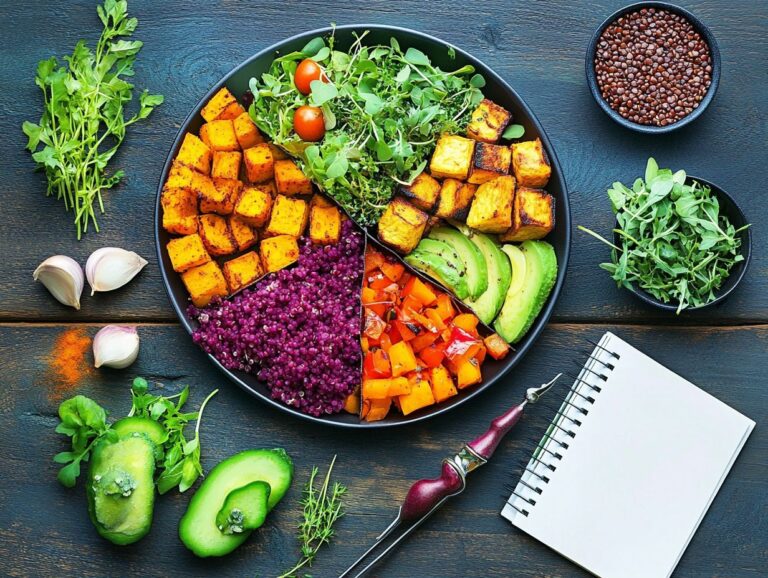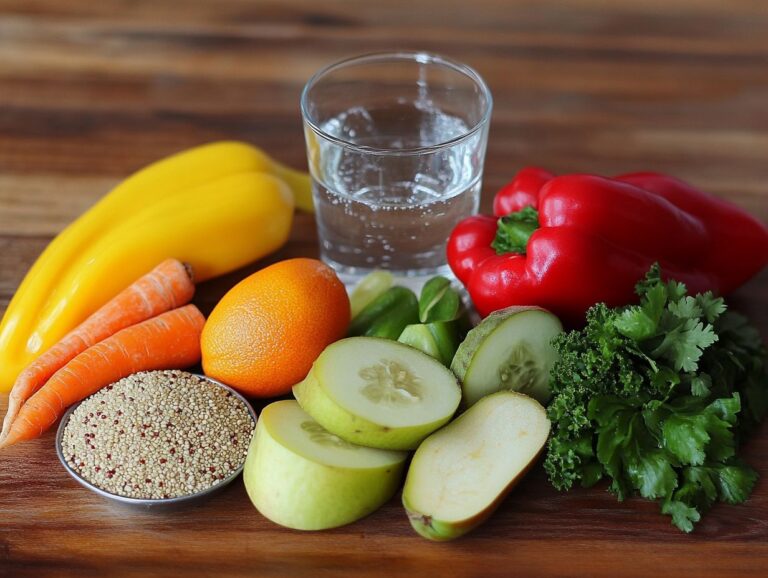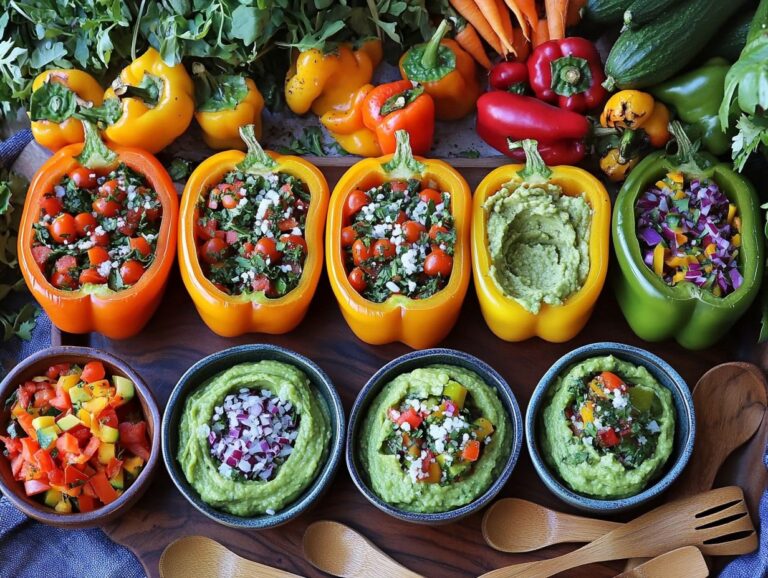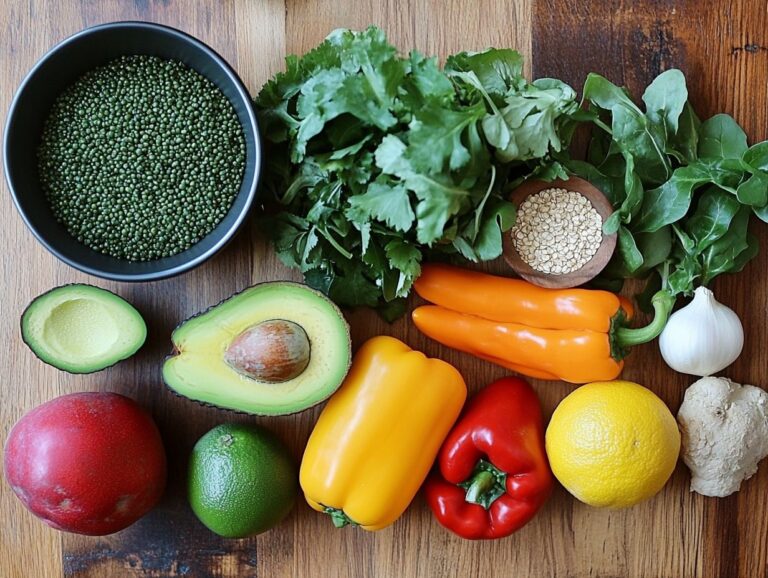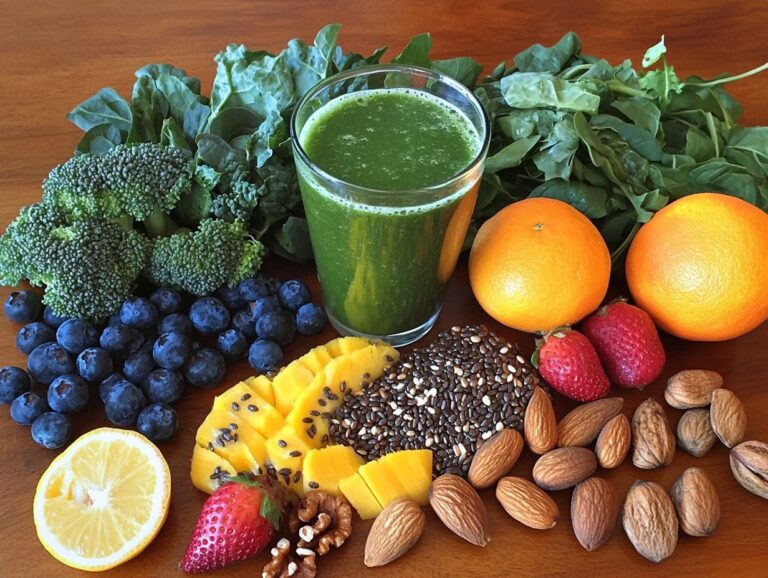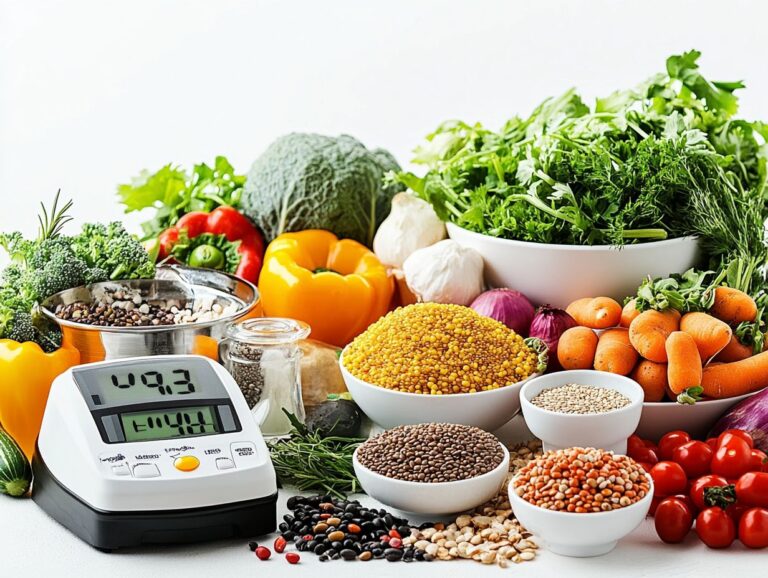In recent years, the 1000-calorie vegan diet has gained popularity as a potential weight loss strategy, offering a plant-based approach that emphasizes low-calorie intake while ensuring nutrient richness. This guide explores the fundamentals of a 1000-calorie vegan diet, including its weight loss benefits and potential health improvements, such as enhanced digestion and increased energy levels. Additionally, it highlights risks to be aware of, such as the possibility of nutrient deficiencies. You will find practical tips for safely implementing this diet, along with a sample meal plan to assist you on your journey. Whether your goal is to lose weight or adopt a healthier lifestyle, this information will provide you with the knowledge you need.
Key Takeaways:
1. A 1000-calorie vegan diet can aid in weight loss by reducing calorie intake and increasing nutrient-dense plant-based foods.
2. This diet may also have potential health benefits such as a lower risk of heart disease and improved digestion.
3. To safely follow this diet, consult a registered dietitian, focus on nutrient-dense foods, and listen to your body’s needs.
What Is a 1000-Calorie Vegan Diet?
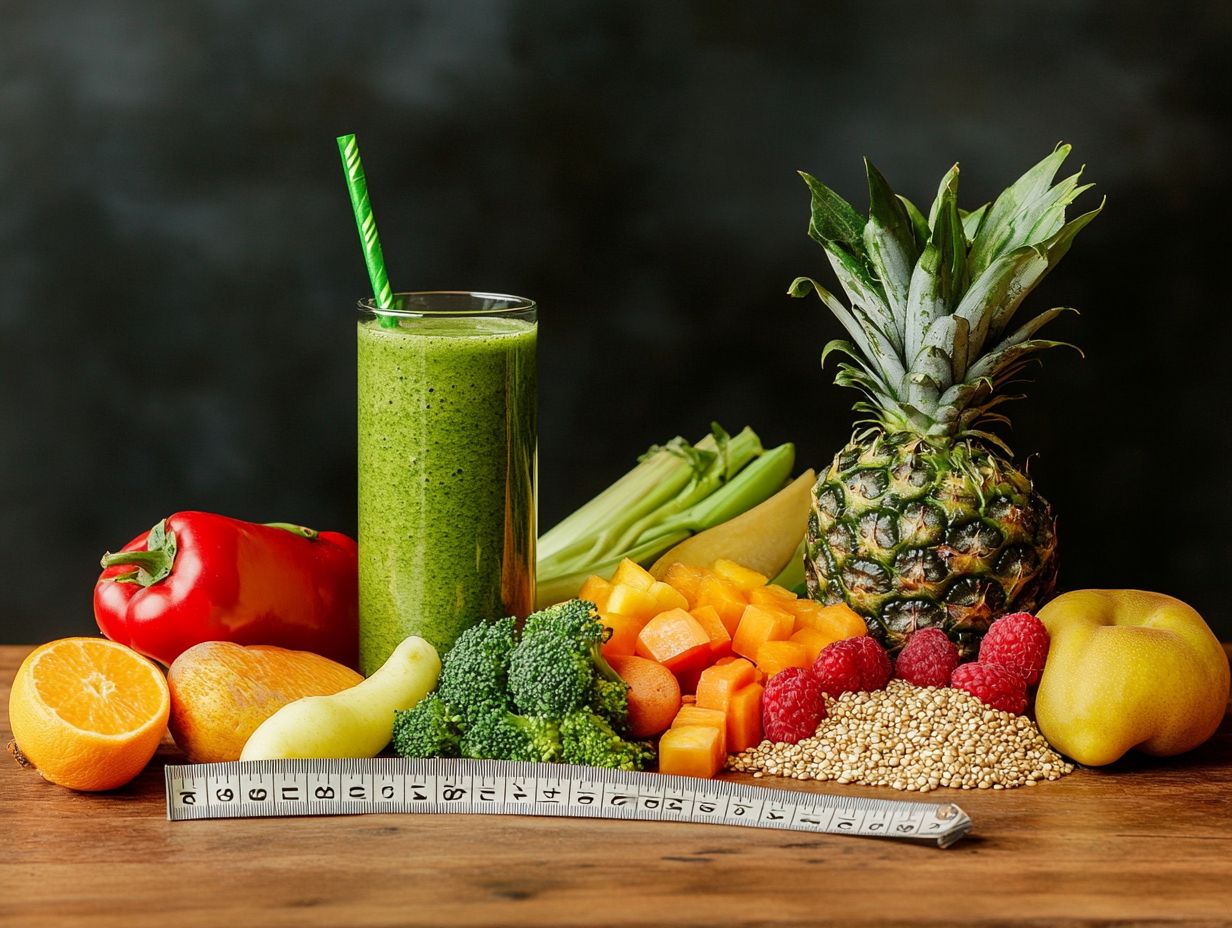
The 1000-Calorie Vegan Diet is a weight management approach in which an individual consumes a limited number of calories while emphasizing whole plant foods. This diet focuses on the healthiest nutrient-dense options that are low in calorie density but high in vitamins, minerals, and fiber. Understanding caloric density and incorporating higher nutrient density foods are key components of this approach.
It has gained popularity among Americans seeking to lose weight without sacrificing essential nutrition, making it an effective tool for those looking to enhance their lifestyle. By prioritizing fresh fruits, non-starchy vegetables, and whole grains, followers of the 1000-Calorie Vegan Diet can enjoy a satisfying meal plan that promotes holistic well-being. Many have tried to lose weight by adopting this balanced approach, which aligns with weight management principles.
How Does a 1000-Calorie Vegan Diet Help with Weight Loss?
A 1000-calorie vegan diet aids in weight loss by utilizing the principles of calorie density. This approach involves selecting foods range based on their calories per pound, enabling individuals to enjoy larger portions while adhering to a lower calorie limit and focusing on nutrient-dense, plant-based diets.
As a result, this diet not only promotes satiety but also aligns with research from the Centers for Disease Control and Prevention, which indicates that many Americans struggle with obesity due to the prevalence of calorie-dense processed foods in the standard American diet, loaded with processed options.
What Are the Potential Health Benefits of a 1000-Calorie Vegan Diet?
A 1000-Calorie Vegan Diet offers numerous potential health benefits. Research indicates that adopting a vegan diet can significantly reduce the risk of standard American diseases such as obesity, diabetes, and heart disease. This strategy involves avoiding calorie-dense food and focusing on plant-based diets to leverage health benefits.
Dr. Garth Davis, a surgeon and expert in obesity and weight loss, explains that a plant-based diet focused on whole foods provides essential nutrients while reducing caloric intake. This combination can lead to improved health outcomes and increased longevity, particularly when avoiding added oils and vegan junk foods.
1. Lower Risk of Heart Disease
A 1000-Calorie Vegan Diet can effectively reduce the risk of heart disease by encouraging the consumption of nutrient-dense foods that are high in fiber, which in turn lowers bad cholesterol and blood pressure.
This diet emphasizes the intake of fruits, vegetables, whole grains, legumes, and nuts, all of which are vital sources of vitamins, minerals, antioxidants, and healthy fats, contributing to a balanced macronutrient distribution.
Heart disease is one of the leading causes of death among Americans, and diet plays a significant role in this statistic. Research indicates that plant-based diets can lower the risk of heart disease by up to 32%.
The high fiber content in these foods helps reduce LDL cholesterol, while their antioxidant properties combat inflammation, both of which contribute to better cardiovascular health.
Therefore, making these dietary choices can have a substantial positive impact on heart health and overall well-being.
2. Improved Digestion
One of the notable benefits of a 1000-Calorie Vegan Diet is its positive impact on digestion. The high fiber content from whole plant foods promotes regular bowel movements and supports a healthy gut microbiome.
This enhanced digestive function is largely due to fiber’s role in facilitating the movement of food through the digestive tract, which helps prevent constipation and other gastrointestinal issues. Research indicates that a diverse range of fiber-rich foods, including legumes, whole grains, fruits, and vegetables, positively influences gut health.
For instance, lentils and chickpeas, which are both high in fiber and protein, are staples in a calorie-smart plant-based diet. Additionally, pears and avocados provide soluble fiber, which has been shown to nourish beneficial bacteria in the gut.
Maintaining good digestive health is especially important for those seeking weight loss, as a healthy digestive system is more effective at absorbing nutrients and sustaining a balanced metabolism.
3. Increased Energy Levels
Individuals following a 1000-calorie vegan diet often experience increased energy levels due to their consumption of whole plant foods, which are nutritious and provide sustained energy without the sudden spikes and crashes associated with calorie-dense foods typical of the standard American diet. To maintain this, it is crucial to eat your veggies and avoid liquid calories.
To achieve the right balance of macronutrients, it is essential to include a wide variety of whole plant-based foods, such as:
- Legumes
- Whole grains
- Nuts
- Seeds
- A diverse selection of fruits and vegetables
- Nonstarchy veggies
- Vegetable broth
This approach ensures the intake of protein, healthy fats, and carbohydrates, all of which are necessary for proper bodily function.
However, a low-calorie intake of a 1000-calorie vegan diet, if not carefully monitored, can lead to deficiencies in certain nutrients, particularly vitamins and minerals vital for energy production.
To maintain energy levels on a low-calorie diet, it is important to consume high-fiber foods, drink plenty of water, and consider supplements if necessary, ensuring that all meals provide adequate nutrition.
4. Better Blood Sugar Control
A 1000-calorie vegan diet can have a positive impact on blood sugar levels, helping to prevent and manage diabetes. This diet includes low-glycemic index, high-fiber foods, and fiber-rich foods that slow the absorption of sugar into the bloodstream.
Common foods in this category include vegetables, legumes, whole grains, and nuts, all of which contribute to maintaining stable glucose levels. Research has shown that individuals who follow plant-based diets tend to have better insulin sensitivity and lower fasting blood sugar levels.
For instance, a study published in the Journal of Nutrition found that participants consuming a high-fiber vegan diet experienced significantly lower blood glucose responses after meals.
Experts often recommend incorporating foods like quinoa, lentils, and sweet potatoes, as these not only provide essential nutrients but also promote a sense of fullness, helping to reduce unhealthy snacking and further stabilize blood sugar levels.
What Are the Potential Risks of a 1000-Calorie Vegan Diet?
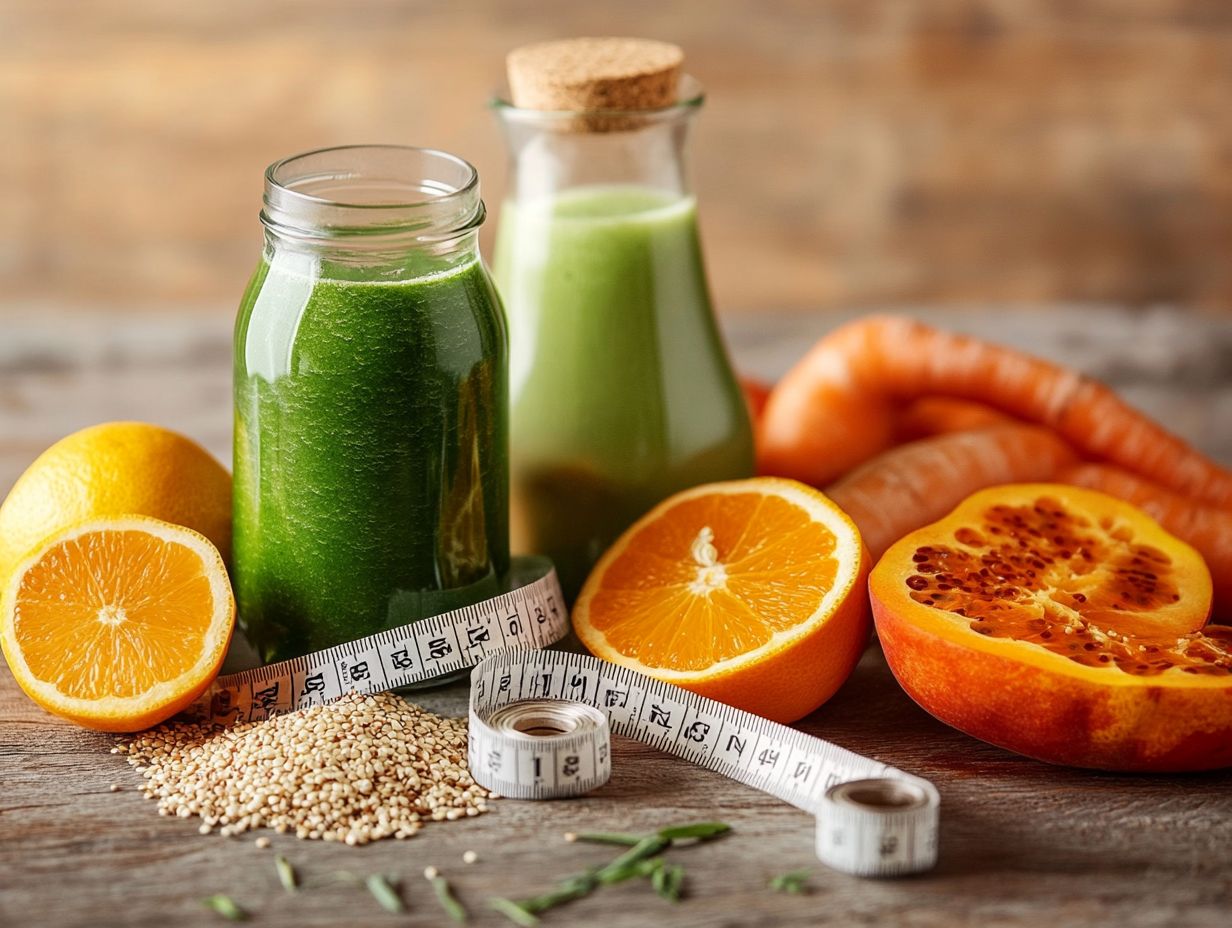
A 1000-calorie vegan diet can result in nutrient deficiencies and low energy levels, among other risks, particularly if it is not carefully planned and monitored.
1. Nutrient Deficiencies
Nutrient deficiencies can arise on a 1,000-calorie vegan diet if individuals do not include a variety of plant-based proteins, essential vitamins, and minerals in their meal plans. Without careful attention, it is easy to overlook important nutrients such as vitamin B12, iron, calcium, and omega-3 fatty acids. Individual results may vary, so it’s important to tailor the diet to personal needs.
Vitamin B12 is primarily found in animal products, so those following a strict vegan diet should rely on fortified foods or supplements to meet their needs. Iron, which is present in lentils and leafy greens, is best absorbed when consumed alongside vitamin C-rich foods. Calcium, essential for bone health, can be obtained from sources such as almond milk and tofu. To boost omega-3 levels, incorporating flaxseeds or chia seeds is beneficial.
By making diverse food choices and planning meals carefully, individuals can significantly reduce the risk of nutrient deficiencies.
2. Low Energy Levels
Low energy levels are a common side effect of a 1000-calorie vegan diet, especially if individuals do not primarily consume high-nutrition foods that provide adequate energy and sustenance.
When caloric intake is reduced so drastically that it falls below the body’s energy requirements, individuals may experience fatigue that limits daily activities and negatively impacts overall health. This fatigue is often due to a deficiency in essential vitamins and minerals that are crucial for energy production in the body.
To mitigate this, those following a low-calorie diet should focus on incorporating a variety of whole grains, legumes, nuts, and seeds, which are rich in essential nutrients. By doing so, they can maintain better energy levels, fostering a more active lifestyle and enhancing mood throughout the day, even on a restricted calorie intake.
3. Difficulty Maintaining Weight Loss
For some individuals following a 1,000-Calorie Vegan Diet, maintaining weight loss can be challenging without implementing long-term changes or adopting a balanced approach to caloric intake and eating habits.
Initial success may lead to psychological obstacles, such as feelings of deprivation or anxiety around food, which can trigger a return to behaviors that undermine their goal weight. Additionally, physical challenges, such as deficiencies in essential nutrients, can lead to poor health outcomes.
To achieve lasting results, individuals are best served by focusing on a holistic approach that prioritizes overall health and well-being. This includes incorporating regular exercise, practicing mindfulness, and seeking social support to cultivate a sustainable lifestyle that promotes weight loss maintenance while enhancing self-confidence and happiness in daily life. Embracing plant-based diets, which are loaded with plant-based protein and fiber-rich foods, further aids in weight management while combating standard American diseases like diabetes, heart disease, and obesity.
How to Safely Follow a 1000-Calorie Vegan Diet?
The safest way to follow a 1,000-calorie vegan diet is to consult with a registered dietitian, especially since vegan diets may present unique challenges like nutrient deficiencies if not properly managed.
They can provide personalized recommendations that ensure your food choices are balanced and nutrient-dense, supporting your overall health.
1. Consult a Registered Dietitian
Consulting a registered dietitian is essential when following a 1,000-calorie vegan diet. They can provide personalized dietary recommendations to meet individual needs, prevent potential nutrient deficiencies, and ensure a balanced macronutrient distribution.
Registered dietitians have a strong background in nutrition science, enabling them to assess individual health conditions and lifestyle factors to create a customized meal plan that fulfills both caloric and nutritional goals. Their expertise is invaluable in navigating the challenges associated with vegan nutrition.
Through working with a dietitian, individuals can learn how to increase meal variety, incorporate fortified foods, or take supplements if necessary, thereby maximizing health benefits and minimizing the risks of inadequate nutrition.
2. Focus on Nutrient-Dense Foods
A 1000-Calorie Vegan Diet relies on nutrient-dense foods, which offer the highest nutritional value with the fewest calories, embodying the principles of low-calorie density and higher nutrient density through whole plant foods.
Whole grains, such as quinoa and brown rice, supply sustained energy due to their content of complex carbohydrates. Legumes, including lentils and chickpeas, provide protein and fiber, which help promote feelings of fullness and support digestive health.
A variety of fruits deliver essential vitamins, minerals, antioxidants, and hydration, while non-starchy vegetables like leafy greens and broccoli offer important nutrients with minimal calories.
This combination not only enhances overall health by boosting immune function and reducing inflammation but is also vital for effective weight management, as it encourages mindful eating habits and lowers the risk of overeating.
3. Incorporate Plant-Based Proteins
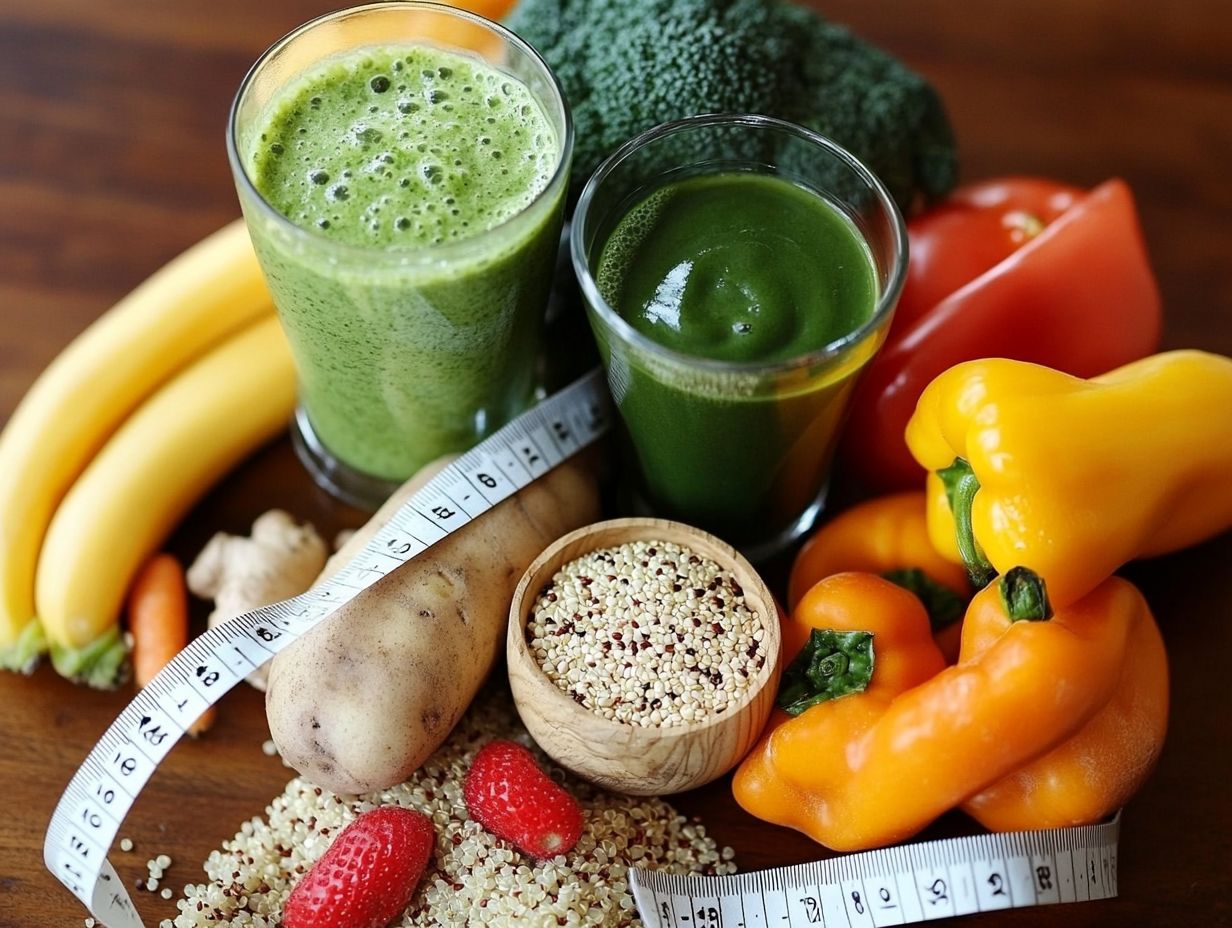
Plant-based proteins are essential components of a 1,000-calorie vegan diet, as they play a crucial role in maintaining muscle mass and overall health.
These proteins can be found in many staple foods such as lentils, chickpeas, quinoa, and tofu. They contain essential amino acids that are vital for various bodily functions, and a balanced intake of these foods provides nourishment as well as a sense of fullness, which helps control appetite levels and supports weight management.
Incorporating dishes like a hearty chickpea salad or quinoa stir-fry into the diet allows individuals to meet their nutritional needs while enjoying delicious meals.
Additionally, snacks like edamame and roasted pumpkin seeds are rich in protein and can be consumed between meals to provide an extra protein boost, supporting weight loss on a vegan diet.
4. Stay Hydrated
Adequate hydration is a vital component of a 1000-Calorie Vegan Diet, as it is essential for overall health and aids in digestion. Sufficient water intake can significantly improve energy levels, helping individuals feel more awake and active throughout the day.
Hydration plays a crucial role during the digestive process by helping with the breakdown of food, allowing the body to absorb nutrients effectively. It also dissolves nutrients and minerals, making them accessible for the body to utilize.
To avoid liquid calories that could easily disrupt caloric goals, it is advised to stick to calorie-free beverages. To ensure adequate liquid intake throughout the day, carrying a reusable water bottle can serve as a helpful reminder to drink regularly. Additionally, herbal teas and infused waters can add variety without contributing calories, making it easier to meet hydration goals while staying within a calorie limit.
5. Listen to Your Body
Listening to your body is crucial when following a 1000-calorie vegan diet, as it allows individuals to assess their energy levels, hunger, and potential nutrient deficiencies, ensuring that individual results align with one’s health goals.
By paying attention to their body’s signals, people can make more informed decisions about what and when to eat, leading to a more personalized approach to nutrition.
This self-awareness not only helps individuals determine which foods are most beneficial for their bodies but is also essential for effective weight management.
As people learn to make food choices that suit their needs, being aware of how their bodies respond to different foods will enable them to make adjustments that positively impact their overall health.
Remember that achieving your desired outcomes takes time; listening to yourself can facilitate gradual changes that are right for you.
Sample 1000-Calorie Vegan Diet Plan
A 1000-calorie vegan diet plan serves as an excellent example of a vegan diet that incorporates a variety of healthy whole plant foods, emphasizing foods range that supports overall wellness.
These foods are low in calorie density but high in nutrients.
1. Breakfast
Breakfast options for a 1,000-calorie vegan diet can be both nutritious and satisfying. A great choice is oatmeal topped with fresh fruits and chia seeds, which provides fiber and essential nutrients, embodying health benefits and holistic well-being.
Other healthy breakfast alternatives include:
- A spinach, banana, and almond milk smoothie that delivers a rich mix of vitamins while keeping calories low.
- Whole grain toast with avocado and tomato slices that offers healthy fats and antioxidants.
Incorporating a variety of nutrient-dense foods not only adds flavor but also helps you feel full and energized throughout the morning.
2. Snack
Some examples of snacks for a 1,000-calorie vegan diet include a small serving of raw vegetables paired with hummus, which offers healthy fats and a satisfying crunch.
Colorful options like bell peppers, baby carrots, and cucumber slices are excellent choices, as they are low in calories but high in vitamins.
Additionally, plant-based edamame can serve as a nutritious snack that provides protein, iron, and other essential nutrients.
For a fruity option, sliced apples with almond butter or a handful of berries are rich in antioxidants and fiber, making them a balanced and low-calorie addition to daily nutrition.
3. Lunch
A satisfying salad made with mixed greens, chickpeas, and a vinaigrette crafted from vegetable broth is an excellent lunch option for a 1000-calorie vegan diet.
Incorporating ingredients like quinoa, cherry tomatoes, and avocado can enhance the nutritional profile and keep the meal interesting, reflecting the principles of understanding caloric density and calorie density.
Another great choice is a whole grain tortilla wrap filled with hummus, shredded carrots, and spinach.
For those who prefer warm meals, a bowl of vegetable soup with lentils offers essential vitamins and minerals, adding a comforting element to the lunch experience.
Each of these plant-based options highlights the versatility of whole foods, providing creative opportunities while ensuring that every bite is both nourishing and satisfying.
4. Snack
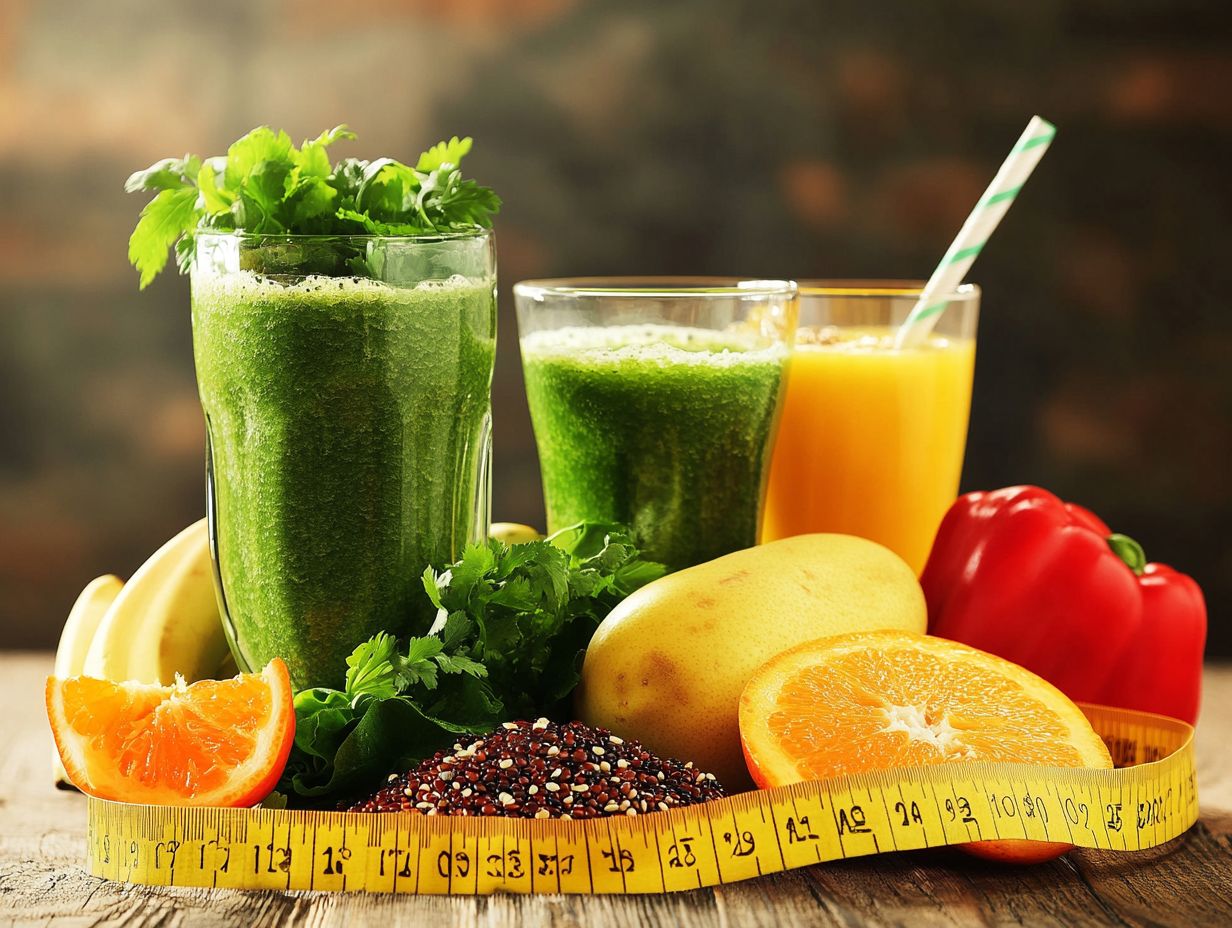
A great snack option is a piece of fruit, such as an apple or a banana. Fruits offer natural sweetness and essential vitamins while typically being low in calories.
These easy-to-prepare choices can be incorporated into a balanced diet, particularly for those limiting their caloric intake to 1,000 calories per day. Snacks that are high in fiber not only enhance digestive function but also promote feelings of fullness and help control hunger throughout the day.
Having a wide variety of these snacks can encourage healthy eating habits and make it easier to avoid unhealthy alternatives. These fruits can be enjoyed on their own or paired with a handful of nuts for added protein, positively impacting overall health while remaining calorie-conscious.
5. Dinner
Dinner on a 1000-calorie vegan diet could consist of a stir-fry with tofu, vibrant non-starchy vegetables, and quinoa as a protein source. This meal is not only filling but also rich in various nutrients and can be prepared to incorporate a diverse range of flavors and textures.
Alternatively, one might enjoy a hearty lentil soup accompanied by a fresh salad featuring avocado and nuts, which offer healthy fats and fiber, supporting a balanced macronutrient distribution.
Introducing different grains, such as farro or barley, can also create a satisfying base for many meals, ensuring that every dinner is both enjoyable and nutritious, fitting within the framework of weight management.
6. Dessert
A small bowl of blended frozen bananas with a splash of plant-based milk for creaminess makes for an excellent dessert. This creamy dish mimics the mouthfeel of ice cream or soft serve but contains far fewer calories.
It provides a satisfying dessert experience while being made from whole, natural ingredients that align with the principles of a 1000-Calorie Vegan Diet. To enhance the dessert’s flavor, you can add a dash of cinnamon or a few cacao nibs, both of which help maintain its natural sweetness.
Another delightful option is chia seed pudding, which combines almond milk to soak the seeds and pure vanilla extract for flavor, resulting in a more nutrient-dense and filling dessert.
These dishes demonstrate that enjoying a treat does not have to compromise one’s health, allowing desserts to be both pleasurable and nutritious.
Tips for Long-Term Success on a 1000-Calorie Vegan Diet
Achieving long-term success on a 1000-calorie vegan diet relies on making sustainable lifestyle adjustments, as well as implementing strategies that foster accountability and promote the motivation needed to maintain the diet over time. Understanding the concepts behind caloric density and calorie-dense food choices can guide individuals towards healthier habits and holistic well-being.
1. Focus on Sustainable Changes
Focusing on sustainable changes is essential for long-term success on a 1000-Calorie Vegan Diet, as it encourages individuals to implement lasting lifestyle modifications rather than temporary solutions. Americans who tried to lose weight last calendar year can benefit greatly from understanding caloric density and making informed choices.
Gradual dietary changes can significantly improve overall health and wellness, which is crucial for those aiming to maintain their weight successfully. Instead of making rapid alterations that often lead to burnout or frustration, a sustainable approach allows for balanced caloric intake while still meeting nutritional requirements.
By prioritizing whole, nutrient-dense foods, individuals can foster a healthier relationship with food. This process not only aids in weight maintenance but also helps to establish habits that can be easily sustained over time—an essential aspect of sustainable eating. Whole plant foods and fresh fruits are particularly beneficial as they are loaded with processed nutrients and higher nutrient density.
2. Find Support and Accountability
Support and accountability play a crucial role in achieving success on a 1000-Calorie Vegan Diet. Sharing the experience with a community or a diet buddy can significantly enhance motivation and adherence to dietary goals. For instance, many individuals find support through resources like the Plant-Based Lifestyle Medicine Program at NYC Health + Hospitals/Bellevue or the Mission Weight Management Center in Asheville, North Carolina.
Thanks to the internet, numerous online forums and social media groups have emerged where individuals interested in a plant-based lifestyle can connect, share their experiences, recipes, and tips. Websites like EatingWell.com and Forks Over Knives offer valuable insights and community support for those on this journey.
Additionally, seeking out local meetups or workshops can foster a sense of community and belonging. Engaging with others in this journey provides motivation and cultivates a collective sense of purpose and commitment.
This accountability can help alleviate feelings of isolation and keep individuals focused, thereby maximizing the psychological benefits of pursuing dietary goals together.
3. Incorporate Variety in Your Diet
In the 1000-Calorie Vegan Diet, incorporating a variety of foods is essential to prevent boredom and ensure a wide range of nutrients is consumed. Nonstarchy vegetables, whole plant-based foods, and plant-based protein should be included to ensure balanced macronutrient distribution and to avoid nutrient deficiencies.
4. Prioritize Self-Care and Mental Health
Self-care and mental health are crucial components of a 1000-Calorie Vegan Diet, as emotional well-being significantly affects dietary choices and adherence to the diet. Practices like mindfulness meditation and the guidance from experts such as Chef AJ, Micaela Karlsen, and Sharon Palmer can aid in maintaining holistic well-being.
The journey toward a balanced and healthy lifestyle can be challenging, making it essential to cultivate a positive and mentally healthy environment. Programs like The Forks Over Knives Plan and books such as Proteinaholic by Dr. Garth Davis can provide additional guidance and inspiration.
In a low-calorie diet, recognizing the triggers of stress and emotional eating is vital. Practices such as mindfulness meditation, journaling, and regular exercise can effectively alleviate stress. Avoiding vegan junk foods and calorie-dense food, while focusing on nutritional powerhouses like nonstarchy veggies, can greatly improve outcomes.
Additionally, being part of a community or having supportive friends who share similar goals can provide accountability and help reduce cravings that arise from emotional states. Engaging in activities that involve physical activity and maintaining a regular routine can further support weight management and overall health benefits.
